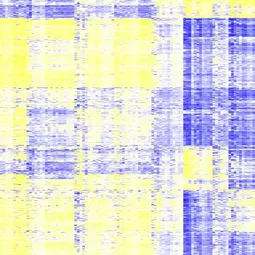Epigenetics
- Cell and Tumor Biology

Prof. Dr. Frank Lyko
Epigenetic mechanisms regulate context-dependent gene expression patterns. However, many mechanistic and biological questions about epigenetics remain to be fully understood. The Division of Epigenetics has developed a specific focus on environment-dependent epigenetic changes and investigates these changes in various biological contexts, with a special focus on cancer prevention.

Our Research
Much of our research focuses on DNA methylation, which is the longest-known and best-understood epigenetic modification. In addition, we also address RNA modifications, which provide an important mechanistic complement to DNA methylation. In our cancer epigenetics projects, we characterize environmental epigenetic changes in disease continuums, from healthy tissue to malignant tumors, with a focus on colon cancer and non-melanoma skin cancer. We are also using molecular and cellular approaches to functionally characterize RNA modifications, with a focus on bladder cancer. Finally, we are developing new model systems for epigenetics research that allow fundamentally novel insight into the interactions between the environment and the genome. This has spawned major developmental activities in diverse fields, such as age prevention, animal welfare monitoring and sustainable food production. While these projects go beyond cancer research, they illustrate the major societal relevance and impact of epigenetics research.
Projects

Our work in cancer epigenetics focuses on colon cancer and on non-melanoma skin cancer, two entities that are characterized by a strong influence of environmental/lifestyle factors. To elucidate the role of DNA methylation in colon cancer formation, we are using multi-modal epigenome sequencing (WGBS, ATAC-seq, RNA-seq) approaches on mouse models and patient samples. For example, we have discovered stable DNA methylation signatures that are maintained from the cancer cell-of-origin through colorectal adenoma and carcinoma formation, which provides new possibilities for the development of risk stratification biomarkers. We are also investigating the role of epigenetic regulators in intestinal inflammation, which represents a major risk factor in colon cancer formation. In this context, we discovered that the Tet2/3 demethylases provide an important interface between the intestinal microbiota and intestinal inflammation. Our work on non-melanoma skin cancer centers around the dynamic changes in DNA methylation patterns that are observed in the disease continuum ranging from UV-light exposed skin and premalignant lesions to keratinocyte cancers. Our approach is based on the integration of (bulk and single-cell) DNA methylation and gene expression data from clinical samples.

The rapidly developing field of epitranscriptomics represents a conceptual extension of epigenetics that focuses on chemical modifications of RNA molecules and their roles in modulating gene expression at the level of RNA stability and/or protein translation. Our previous work focused on the DNMT2 tRNA methyltransferase and uncovered how RNA modifications can result in genome recoding. More recently, we have focused on the role of the microbial micronutrient queuine (Q) in translational control. More recently, we have shifted our focus to mRNA adenine methylation, a modification that is more closely connected to tumor formation. In this context, we have characterized the role of individual proteins associated with this modification in bladder cancer formation and progression. More recently, we have started to use novel methods for single-base resolution mapping of tumor mRNA methylomes to fully understand cancer-related changes in mRNA adenine methylation.

We have a longstanding interest in analyzing environmentally induced epigenetic changes. One key example is our research on human skin aging, where we have developed and applied epigenetic clocks to measure biological age. Together with industry partners, we developed a novel scientific concept that aims to leverage our knowledge about epigenetic clocks into the identification of novel rejuvenating compounds that can be used for anti-aging applications. As age represents the most important risk factor for tumor formation, this concept is also highly relevant for cancer prevention. We have also identified and characterized environmental DNA methylation signatures in a variety of animal livestock, as these are often characterized by more homogeneous genomes and provide unique opportunities for environmental tracing. Finally, we established the marbled crayfish, a parthenogenetically reproducing (clonal) freshwater crayfish as an intriguing model system to investigate clonal genome evolution and epigenetic adaptation, two processes that are highly relevant for understanding tumor development. Interestingly, our work with marbled crayfish also revealed that these animals have exciting and potentially transformative potential as novel aquaculture livestock, which is developed through our spin-off company Merall Bioproducts.
Team
-

Prof. Dr. Frank Lyko
Head of Division
-

Dr. Manuel Rodriguez Paredes
Deputy Head of Division
-

Ines Schäfer
Team Assistant
-

Erika Tarabová
Project Assistant
-

Katharina Hanna
Technical Assistant
-

Tanja Musch
Technical Assistant
-

Dr. Lisa Görs
Scientist
-

Dr. Günter Raddatz
Scientist
-

Dr. Ariane Schmidt
Scientist
-

Dr. Geetha Venkatesh
Scientist
-

Jose Jaime Diaz Larrosa
PhD Student
-

Yan Feng
PhD Student
-

Oliver Richard Gilliam
PhD Student
-

Zoe Saßmannshausen
PhD Student
Selected Publications
Schütz, S., Solé-Boldo, L., Lucena-Porcel, C., Hoffmann, J., Brobeil, A., Lonsdorf, A.S., Rodríguez-Paredes, M., and Lyko, F.
Solé-Boldo, L., Raddatz, G., Gutekunst, J., Gilliam, O., Bormann, F., Liberio M.S., Hasche, D., Antonopoulos, W., Mallm J.P., Lonsdorf, A.S., Rodríguez-Paredes, M., and Lyko, F.
Get in touch with us
